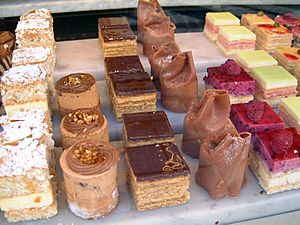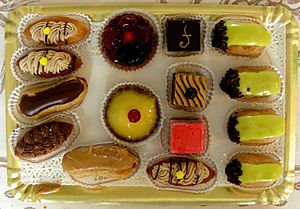Petit four facts for kids

An assortment of petits fours
|
|
| Type | Confectionery |
|---|---|
| Course | Dessert |
| Place of origin | France |
| Main ingredients | Varies by type |
A petit four (pronounced "peh-TEE FOOR") is a super small, bite-sized treat. It can be a sweet dessert or a savory snack. The name comes from French and means "small oven." These tiny delights are perfect for parties or as a little something sweet after a meal.
A Little Bit of History
Back in the 1700s and 1800s in France, there were no gas ovens like we have today. Bakers used huge brick ovens that took a very long time to heat up for baking bread. Once the bread was done, the ovens would slowly cool down.
Bakers were clever! They didn't want to waste the heat. So, they used the ovens while they were cooling to bake smaller pastries. These pastries needed a lower temperature. This special way of baking was called à petit four, which means "at small oven." That's how these little treats got their name!
Different Kinds of Petits Fours
Petits fours come in a few yummy types:
- Glacé ("gla-SAY") means "glazed" or "iced." These are tiny cakes or pastries covered in sweet icing, like mini éclairs or small tarts. They look very fancy and colorful!
- Salé ("sa-LAY") means "salted" or "savory." These are bite-sized appetizers. You might find them at a party or a buffet as a tasty snack.
- Sec ("sek") means "dry." These are dainty biscuits, baked meringues, macarons, or light puff pastries. They are often crunchy and delicious.
In a French bakery, you might hear all sorts of small desserts called mignardises. But hard, buttery cookies are usually called petits fours.
See also
 In Spanish: Petit four para niños
In Spanish: Petit four para niños
 | Emma Amos |
 | Edward Mitchell Bannister |
 | Larry D. Alexander |
 | Ernie Barnes |


